Raising the conversation on Female Genital Cutting in Massachusetts
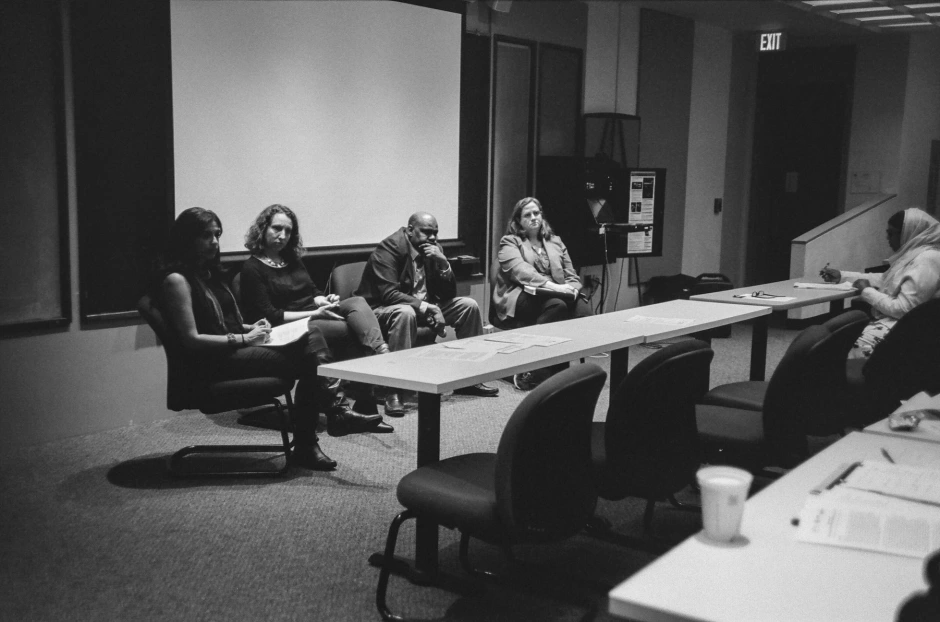
During February, Lesley University and Brandeis University in Massachusetts hosted events to elevate the conversation and build awareness on the topic of FGC as it occurs in the U.S. and the larger global world. On Feb 12th, Lesley University hosted Examining the Intersection Between Tradition and Gender Violence. The event showcased a screening of A Pinch of Skin, a documentary on FGC in India by Priya Goswami, followed by a panel discussion moderated by Mariya Taher with speakers attorney Joanne Golden, community health leader Abdirahman Yusuf, and OBGYN Dr. Melody Eckardt. Panel speakers shared their perspectives on FGC, drawing on their personal experiences with survivors across their multiple cross-cultural and professional fields to bring attention to this often silenced issue. To read more about the event, click here. Additionally, on Feb 14th, The Heller School for Social Policy and Management at Brandeis University hosted a conversation with Mariya Taher on “How Storytelling can Change Social norms, and Help to End Female Genital Cutting.” To learn more about the event, visit ‘A Pinch of Skin’ Documentary Screening and Discussion.
Sahiyo participates in 2017 Hilton Humanitarian Foundation Symposium
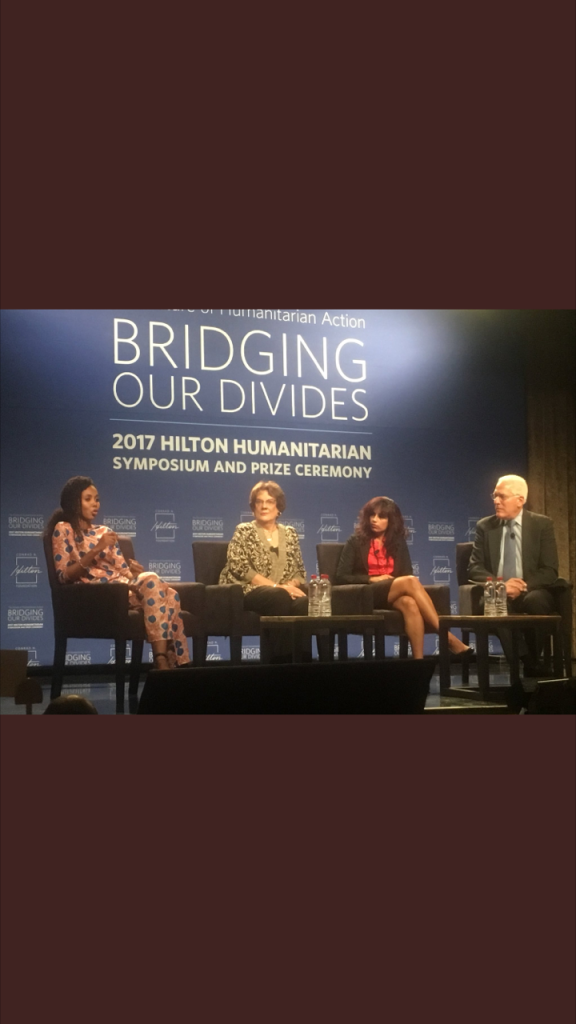
On October 11th, Mariya was invited to take part in the 2017 Hilton Humanitarian Foundation Symposium. Mariya, along with Tostan’s founder Molly Melching, and Safe Hands for Girl’s’ Jaha Dukureh, was on a panel titled “Empowering the Silent to Speak, Engaging Communities to Respond”, to discuss FGC and the work being done to end it. To watch a recap of the event, click here. This year’s 2017 Hilton Humanitarian Prize was presented to icddr,b. To learn more about award recipient, click here.
Working Together To Address FGC: Michigan Roundtable

On October 9th, Sahiyo, along with Equality Now, Tahirih Justice Center, and forma came together in a roundtable discussion with Michigan’s Department of Health and Human Services (DHHS) to engage in cross-discipline dialogue on the challenges and best practices regarding how to respond to FGC in the United States. The roundtable discussion helped attendees to increase their knowledge base on FGC, understand the medical circumstances associated with FGC, and identify strengths, gaps, and policy/law implications that could improve outcomes for children and families. Sahiyo’s Mariya helped to facilitate this initial roundtable, and continues to work with DHHS on next steps to ensure that we work to address the issue of FGC, and how to support survivors, in a holistic manner.
Engendering Progress Event Honours Sahiyo Co-founder
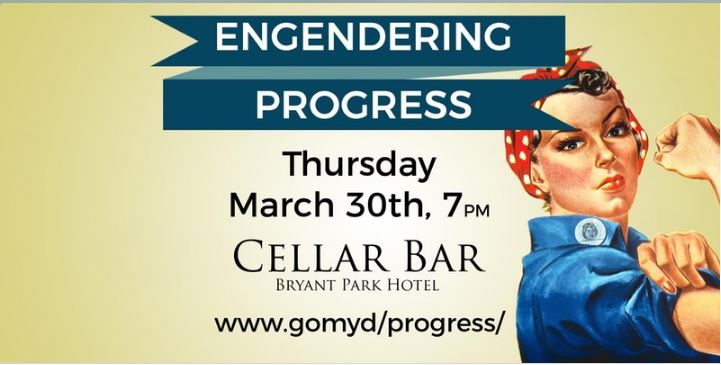
Sahiyo participates in the End Violence Against Girls Summit on FGM/C
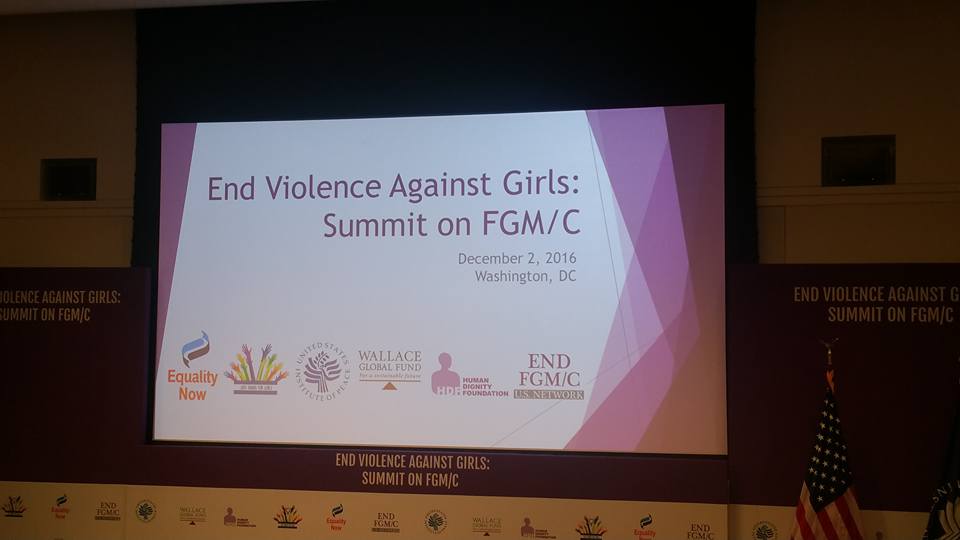
Talking about Gender Justice at the Islamic Society of North America Annual Conference

On Sunday September 4th, Sahiyo’s cofounder, Mariya Taher, participated on a panel entitled, “Gender Justice: A Discussion with Policymakers, Religious Actors, and Activists” at the Islamic Society of North America (ISNA). The Secretary’s Office of Religion and Global Affairs at the U.S. Department of State partnered with Muslim community leaders and organizations to promote gender justice in issues ranging from calls for greater inclusion of women of faith in peace-building to advocating against gender-based violence, including female genital cutting. The panel brought together a diverse set of religious actors, policymakers, and civil society activists to address promoting gender justice within Muslim communities, both domestically and globally. The panel was moderated by Arsalan Suleman and the speakers included Maryum Saifee, Hind Makki, Mariya Taher, Reyhana Patel. Both Mariya and Reyhana addressed the topic of FGC and how their organizations are working towards shedding light on this form of gender violence, often misperceived as a practice rooted in religion. Mariya discussed Sahiyo’s storytelling platform that has crowdsourced testimonials from members of the Dawoodi Bohra community on FGC. Rehyana, from Islamic Relief Canada discussed her report on FGC in Indonesia. The panel also addressed the powerful work of women religious leaders in peace-building and humanitarian assistance. To learn about the “Gender Justice” panel, read more here on the U.S. Department of State Official Blog in a write-up by Maryum Saifee. And as Maryum writes: Panel discussions like the one at ISNA are important platforms. They highlight both the structural challenges and limitations Muslim women continue to face, but also show how they are on the frontlines promoting gender justice in their communities. To view a video of the panel discussion, click here.
Discussing FGC During International Women’s Day event in Pune
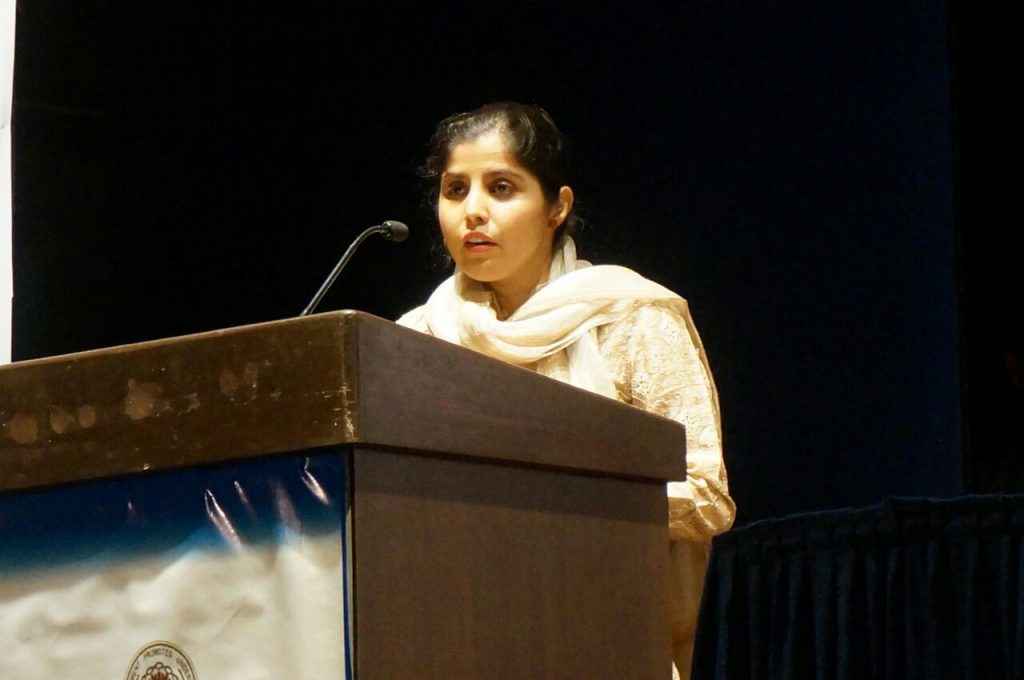
Mariya’s experience at the Women Deliver 2016 Conference

Sahiyo welcomes the new WHO guidelines to improve care for millions living with female genital cutting

The new World Health Organisation guidelines released at the Women Deliver conference, 2016, in Copenhagen is a huge win for Female Genital Mutilation/Cutting activists worldwide. Sahiyo is cheering on too! The guidelines, while defining the practice of various types of FGC, has finally put Asia and Middle East on the map of areas affected along with Africa. As the guidelines state: ‘International migration has now made the practice, prevalent in 30 countries in Africa and in a few countries in Asia and the Middle East, a global health issue.’ Stressing on the need for health care, the guidelines aim to empower health workers acknowledging the crucial role they play, while also acknowledging the gap between health workers’ training and the knowledge of how to tackle the health complications of FGC. As the report states, “Access to the right information and good training can help prevent new cases and ensure that the millions of women who have undergone FGM get the help they need.” Another great aspect touched upon by the guidelines is so called “medicalization” of the practice of FGC – parents asking medical doctors to perform genital cutting because they think it will be less harmful. This is a phenomenon that we, at Sahiyo, have often observed among those who seek to justify Khatna. Several Bohras, particularly in urban spaces, now approach gynaecologists or other doctors within the community to have their daughters cut, and as the WHO guidelines point out, getting healthcare workers to stop participating in this practice is a big challenge. The guidelines have highlighted the need for evidence-based practice and creation of protocols and manuals including ‘what to do when faced with requests from parents or family members to perform FGM on girls’. Some of the focus areas in the report include: Mental health including cognitive behavioral therapy and psychological support to treat depression and anxiety disorders Female sexual health covering sexual counselling to prevent or treat female sexual dysfunction Information and education for all women and girls who have undergone female genital mutilation, and health education and information on de-infibulation, where appropriate, for both health-care providers and for women and girls In conclusion, this is a great set of guidelines incorporating Asia and Middle East and incisively addressing pseudo-scientific practices that often come in the way of dealing with problems that may arise from FGC. It is also significant that the guidelines make a specific mention on the effect of FGC on mental health, since that is a ground much need to be covered by FGC activists and counselors, and is particularly relevant in the context of khatna as practiced by the Bohras. Read the full WHO report here.
Mariya Taher to represent Sahiyo at Women Deliver Conference

Sahiyo is proud to report that cofounder Mariya Taher has been invited by the Orchid Project to attend the Women Deliver Conference in Copenhagen, Denmark and speak at a side event on Tuesday, May 17, 2016, title Female Genital Mutilation/Cutting: Achieving the Global Goal, Together. Detailed information on side event below: Name of Event: Female Genital Mutilation/Cutting (FGM/C): Achieving the Global Goal, Together Organizers: Orchid Project Date: Tuesday, May 17, 2016 Time: 18:00 – 20:00 Description: In partnership, Orchid Project and The Girl Generation will host an interactive panel event to highlight prevalence of FGM/C in countries worldwide and discuss strategies for achieving progress against Global Goals target 5.3. Diverse speakers from practicing countries will unite to share their personal experiences, bringing local activism to the global stage. Audience members will be encouraged to share and compare learnings from different contexts, discussing effective current methods and strategies for ending FGC. Together we aim to take advantage of the recently enshrined target in the Global Goals to hold governments to account and work towards a world free from FGM/C. Speakers Include: Dr Linah Jebill Kilimo, Chair of Anti-FGM Board, Kenya Mariya Taher, Sahiyo, India and United States Kelechukwu Nwachukwu, Nigerian youth activists Filzah Sumartono, Singaporean youth activists from AWARE CHAIRS: Julia Lalla-Maharajh, Orchid Project Faith MWangi-Powell, The Girl Generation ABOUT WOMEN DELIVER CONFERENCE: Women Deliver, the world’s largest conference on the health, rights, and wellbeing of girls and women in the last decade, will be held on May 16-19th. The conference will bring together diverse voices and interests to drive progress in maternal, sexual, and reproductive health and human rights. Allies from around the world will come together to build capacity, share solutions, and forge partnerships, together creating coalitions, communications, and action that spark political commitment and investment in girls and women. The work of Women Deliver will include: Convening global and regional conferences Engaging new allies in the movement Building the next generation of advocates Developing advocacy tools and resources. To learn more about the conference, you can visit http://www.womendeliver.org/
